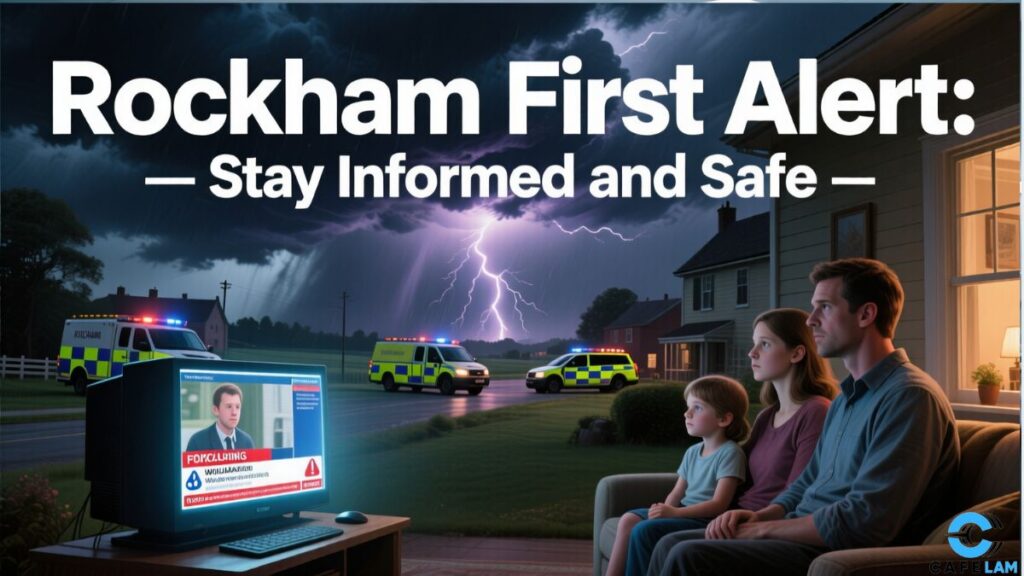In today’s world, where natural disasters, severe weather, and unexpected emergencies can strike at any moment, having access to timely and accurate information can make all the difference. This is where Rockingham First Alert comes in—a vital emergency notification system designed to keep residents of Rockingham County informed, safe, and prepared. Whether it’s a tornado warning, a chemical spill, a power outage, or an Amber Alert, Rockingham First Alert ensures that critical information reaches the public quickly through multiple communication channels.
The system was developed by Rockingham County’s Office of Emergency Services to improve public safety and streamline emergency response efforts. It acts as a two-way communication bridge between local authorities and the community. When an emergency arises, officials can instantly send out alerts to registered users via phone calls, text messages, emails, and even social media updates. This rapid dissemination of information allows people to take immediate action—such as evacuating, sheltering in place, or avoiding hazardous areas—thereby reducing risks and potentially saving lives.
But Rockingham First Alert is more than just a warning system. It also provides non-emergency updates, such as road closures, utility outages, public health notices, and community events related to safety preparedness. By staying connected to this service, residents gain peace of mind knowing they won’t be caught off guard during critical situations.
How Rockingham First Alert Works
At the heart of Rockingham First Alert is a sophisticated mass notification platform that integrates with the county’s emergency management infrastructure. When an incident occurs, authorized personnel from the Emergency Operations Center (EOC) activate the system and craft a message tailored to the specific situation. The alert is then sent to all registered users within the affected geographic area. Thanks to geolocation technology, the system can target only those who are in immediate danger, avoiding unnecessary panic in unaffected regions.
Residents must sign up to receive alerts, as the system does not automatically include everyone in the county. The registration process is simple and can be completed online through the official Rockingham County website. During sign-up, users provide their name, address, phone number, and email, and can choose how they want to receive alerts—via voice call, SMS text, or email. They can also register multiple addresses, such as a home, workplace, or a relative’s residence, ensuring they stay informed no matter where they are.
One of the standout features of Rockingham First Alert is its ability to deliver multilingual messages. Recognizing the diverse population within the county, the system supports alerts in multiple languages, including Spanish, helping ensure that non-English speakers are not left out during emergencies.
Additionally, the system is integrated with the Federal Emergency Management Agency’s (FEMA) Integrated Public Alert & Warning System (IPAWS), which means it can broadcast alerts through Wireless Emergency Alerts (WEA) to mobile devices in the area—even if the user isn’t registered. However, signing up for Rockingham First Alert ensures you receive more detailed and follow-up information beyond the brief WEA messages.
Types of Alerts You Can Receive
The Rockingham First Alert system is designed to cover a wide range of emergency and non-emergency situations. These alerts are categorized based on urgency and impact. Here are the main types of notifications users can expect:
- Severe Weather Warnings – Including tornadoes, thunderstorms, flash floods, winter storms, and hurricanes.
- Public Safety Emergencies – Such as active shooters, hazardous material spills, gas leaks, or major fires.
- Evacuation Orders and Shelter-in-Place Directives – Issued when residents must leave their homes or remain indoors for safety.
- AMBER and Silver Alerts – For missing children or vulnerable adults.
- Utility Outages and Water Advisories – Notifications about power failures, water contamination, or boil-water orders.
- Road and Traffic Alerts – Updates on road closures, detours, or major accidents affecting travel.
- Public Health Notices – Information about disease outbreaks, vaccination clinics, or health risks.
- Community Preparedness Events – Reminders about emergency drills, safety fairs, or disaster preparedness workshops.
Each alert is prioritized based on severity, and users can customize their notification preferences to avoid information overload while still staying informed about critical issues.
Benefits of Enrolling in Rockingham First Alert
Signing up for Rockingham First Alert offers numerous advantages for individuals, families, and businesses alike. First and foremost, it enhances personal safety by providing real-time updates during emergencies. Unlike traditional news sources that may have delays, Rockingham First Alert delivers information directly from official sources the moment it becomes available.
Another major benefit is the ability to receive location-specific alerts. For example, if a chemical spill occurs at a facility in Reidsville, only residents within a certain radius will receive the alert, preventing widespread confusion. This targeted approach ensures that people get only the information relevant to their immediate surroundings.
Parents and caregivers also benefit from the system’s ability to send alerts about school closures or delays due to weather or other emergencies. This helps families plan their day and keep children safe.
For elderly residents or those with medical conditions, Rockingham First Alert can be a lifeline. Knowing in advance about a power outage or extreme weather allows them to prepare medications, secure backup power, or arrange for assistance.
Moreover, businesses can use the system to protect employees and maintain operations. A factory manager, for instance, can receive early warnings about storms and decide whether to suspend operations or send staff home safely.
Rockingham First Alert vs. Other Notification Systems
To understand the value of Rockingham First Alert, it helps to compare it with other common alert systems. The table below highlights key differences:
As shown, Rockingham First Alert offers a more comprehensive, user-friendly, and detailed alert experience compared to national or automated systems.
How to Sign Up for Rockingham First Alert
Enrolling in Rockingham First Alert is a quick and straightforward process. Visit the official Rockingham County government website and navigate to the Emergency Services or Public Safety section. Look for the Rockingham First Alert registration portal. You’ll be asked to enter your full name, physical address, phone number, and email address. You can also add secondary locations if needed.
After submitting your information, you’ll receive a confirmation message to verify your contact details. It’s important to keep your information up to date—especially if you move or change your phone number—so you don’t miss critical alerts.
The service is completely free, funded by the county’s emergency preparedness budget. There are no hidden fees or charges for receiving messages. Once registered, you can manage your preferences at any time, choosing which types of alerts you want to receive and how you want to receive them.
ALSO READ THIS POST: Who Is AndyWarhella? Unveiling the Digital Art Phenomenon and Cultural Movement
Real-Life Impact of Rockingham First Alert
There have been several instances where Rockingham First Alert has proven its worth. During a severe thunderstorm in 2022, the system sent out early warnings about high winds and potential tornadoes. Residents in Eden and Stoneville were able to secure outdoor items, move vehicles to shelter, and take cover before the storm hit. Emergency crews credited the alert system with reducing injuries and property damage.
In another case, when a gas leak was detected near a residential neighborhood in Reidsville, authorities used Rockingham First Alert to issue an immediate evacuation order. Within minutes, over 300 households received calls and texts, allowing them to leave safely before the area was sealed off for repairs.
These real-world examples demonstrate how Rockingham First Alert is not just a technological tool, but a community lifesaver.
Tips for Staying Prepared Beyond the Alerts
While Rockingham First Alert is an essential tool, it should be part of a broader emergency preparedness strategy. Experts recommend that every household maintain an emergency kit with water, non-perishable food, flashlights, batteries, first aid supplies, and important documents. Families should also have a communication plan in place in case members are separated during a disaster.
Staying informed through multiple channels—such as local news, weather apps, and NOAA radio—can further enhance safety. However, Rockingham First Alert remains the most reliable source for official, location-specific guidance directly from emergency managers.
Frequently Asked Questions (FAQs)
1. What is Rockingham First Alert?
Rockingham First Alert is an emergency notification system that sends real-time alerts about disasters, weather, and public safety issues in Rockingham County.
2. Is Rockingham First Alert free to use?
Yes, the service is completely free for all residents and funded by the county government.
3. Can I receive alerts on multiple devices?
Yes, you can register multiple phone numbers and email addresses to receive alerts on different devices.
4. Do I need to re-register every year?
No, but you should update your information if you move or change contact details to ensure you keep receiving alerts.
5. What should I do when I receive a Rockingham First Alert?
Follow the instructions in the message immediately—whether it’s evacuating, sheltering in place, or staying informed through official updates.





